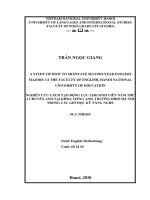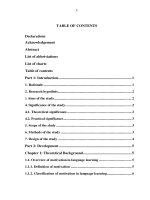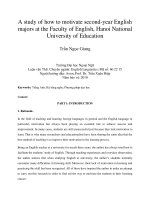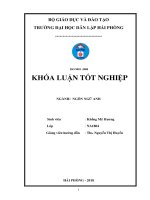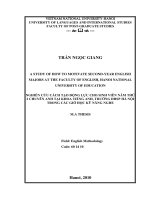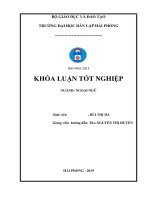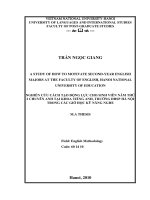How to help first year english majors at HPU avoid common mistakes in speaking lessons
Bạn đang xem bản rút gọn của tài liệu. Xem và tải ngay bản đầy đủ của tài liệu tại đây (1.99 MB, 57 trang )
BỘ GIÁO DỤC VÀ ĐÀO TẠO
TRƯỜNG ĐẠI HỌC DÂN LẬP HẢI PHÒNG
-------------------------------
ISO 9001 :2008
KHÓA LUẬN TỐT NGHIỆP
NGÀNH: NGÔN NGỮ ANH
Sinh viên
: Khổng Mỹ Hương
Lớp
: NA1804
Giảng viên hướng dẫn
: Ths. Nguyễn Thị Huyền
HẢI PHÒNG - 2018
i
MINISTRY OF EDUCATION AND TRAINING
HAIPHONG PRIVATE UNIVERSITY
-----------------------------------
HOW TO HELP FIRST YEAR ENGLISH MAJORS
ATS HPU AVOID COMMON MISTAKES
IN SPEAKING LESSONS
GRADUATION PAPER
Student
: Khong My Huong
Class
: NA1804
Supervisor
: Nguyen Thi Huyen, M.A
HẢI PHÒNG – 2018
ii
BỘ GIÁO DỤC VÀ ĐÀO TẠO
TRƯỜNG ĐẠI HỌC DÂN LẬP HẢI PHÒNG
--------------------------------------
NHIỆM VỤ ĐỀ TÀI TỐT NGHIỆP
Sinh viên: Khổng Mỹ Hương
Mã SV:1412751130
Lớp: NA1804
Ngành:Ngôn Ngữ Anh
Tên đề tài: How to help first year English majors ats HPU avoid common
mistakes in speaking lessons
iii
NHIỆM VỤ ĐỀ TÀI TỐT NGHIỆP
1. Nội dung và các yêu cầu cần giải quyết trong nhiệm vụ đề tài tốt nghiệp
( về lý luận, thực tiễn, các số liệu cần tính toán và các bản vẽ).
............................................................................
............................................................................
...........................................................................
...........................................................................
...........................................................................
...........................................................................
2. Các số liệu cần thiết để tính toán:
..........................................................................
..........................................................................
..........................................................................
..........................................................................
..........................................................................
iv
CÁN BỘ HƯỚNG DẪN ĐỀ TÀI TỐT NGHIỆP
Người hướng dẫn thứ nhất:
Họ và tên: Nguyễn Thị Huyền
Học hàm, học vị: Thạc sĩ
Cơ quan công tác: Trường Đại học Dân lập Hải Phòng
Nội dung hướng dẫn: How to help fisrt year English majors avoid common
mistakes in speaking lessons.
Người hướng dẫn thứ hai:
Họ và tên:.............................................................................................
Học hàm, học vị:...................................................................................
Cơ quan công tác:............................................................................ .....
Nội dung hướng dẫn:............................................................................
Đề tài tốt nghiệp được giao ngày 13 tháng 8 năm 2018
Yêu cầu phải hoàn thành xong trước ngày 02 tháng 11 năm 2018
Đã nhận nhiệm vụ ĐTTN
Đã giao nhiệm vụ ĐTTN
Sinh viên
Người hướng dẫn
Hải Phòng, ngày
tháng
năm 2018
Hiệu trưởng
GS.TS.NGƯT Trần Hữu Nghị
v
PHẦN NHẬN XÉT CỦA CÁN BỘ HƯỚNG DẪN
1. Tinh thần thái độ của sinh viên trong quá trình làm đề tài tốt nghiệp:
……………………………………………………………………………..
……………………………………………………………………………..
……………………………………………………………………………..
……………………………………………………………………………..
……………………………………………………………………………..
2. Đánh giá chất lượng của khóa luận (so với nội dung yêu cầu đã đề ra
trong nhiệm vụ Đ.T. T.N trên các mặt lý luận, thực tiễn, tính toán số
liệu…):
……………………………………………………………………………..
……………………………………………………………………………..
……………………………………………………………………………..
……………………………………………………………………………..
……………………………………………………………………………..
3. Cho điểm của cán bộ hướng dẫn (ghi bằng cả số và chữ):
……………………………………………………………………………..
……………………………………………………………………………..
Hải Phòng, ngày … tháng … năm 2018
Cán bộ hướng dẫn
(Ký và ghi rõ họ tên)
vi
NHẬN XÉT ĐÁNH GIÁ
CỦA NGƯỜI CHẤM PHẢN BIỆN ĐỀ TÀI TỐT NGHIỆP
1. Đánh giá chất lượng đề tài tốt nghiệp về các mặt thu thập và phân tích tài
liệu, số liệu ban đầu, giá trị lí luận và thực tiễn của đề tài.
...............................................................................................................................
...............................................................................................................................
...............................................................................................................................
...............................................................................................................................
...............................................................................................................................
2. Cho điểm của người chấm phản biện : ………………………..
(Điểm ghi bằng số và chữ)
Ngày.......... tháng......... năm 2018
Người chấm phản biện
vii
TABLE OF CONTENT
TABLE OF CONTENT ....................................................................................... i
ACKNOWLEDGEMENTS ................................................................................ 1
PART I: INTRODUCTION ................................................................................ 2
1.Introduction
................................................................................................. 2
2. Rationale ......................................................................................................... 2
3. Aims of the study ............................................................................................ 3
4. Scope of the study ........................................................................................... 3
5. Method of study .............................................................................................. 4
6. Designs of the study ........................................................................................ 4
PART 2: DEVELOPMENT ............................................................................... 6
Chapter 1: THEORETICAL BACKGROUND ................................................... 6
1.1 Introduction ................................................................................................... 6
1.2 Speaking skill
........................................................................................... 6
1.2.1. Definition of speaking skill ....................................................................... 6
1.2.2 The significance of speaking ...................................................................... 8
1.2.3 Stages of speaking ...................................................................................... 9
1.2.3.1 Pre-speaking ............................................................................................ 9
1.2.3.2 While-speaking ........................................................................................ 9
1.2.3.3 Post-speaking......................................................................................... 10
1.3 The difficulties faced by students in learning speaking skills ...................... 10
1.3.1 Lack of environment................................................................................. 10
1.3.2 Fear of Mistake ......................................................................................... 10
1.3.3 Shyness ..................................................................................................... 10
1.3.4Anxiety
.................................................................................................. 11
1.3.5 Lack of Confidence ................................................................................. 11
1.3.6 Lack of Motivation ................................................................................... 11
1.4. Common mistakes in speaking ................................................................... 12
1.4.1 Grammar................................................................................................... 12
1.4.2 Vocabulary ............................................................................................... 12
viii
1.4.3 Pronunciation............................................................................................ 13
1.4.3.1 Ending sound ......................................................................................... 13
1.4.3.3 Sound connection .................................................................................. 14
1.4.3.4 Mispronunciation ................................................................................... 14
1.4.4
Intonation .............................................................................................. 15
1.5 Communicative language teaching .............................................................. 16
1.6 Conclusion ................................................................................................... 16
Chapter 2: THE SURVEY QUESTIONNAIRE ................................................ 17
2.1. Participants and purposes of the survey questionnaire ............................... 17
2.2.1 Data and analysis ...................................................................................... 18
2.2.2 Findings and discussion ............................................................................ 28
3.1 Suggestions to improve listening skill ......................................................... 30
3.1.1 Favorite topic......................................................................................... 30
3.1.2 Dictation ................................................................................................... 31
3.1.3 Music and songs ....................................................................................... 31
3.2 . Solutions to improve speaking skill ........................................................... 32
3.2.1 Pre-speaking activities .............................................................................. 32
3.2.1.1 Warm-up games..................................................................................... 32
APPENDIX 1: THE SURVEY QUESTIONNARE FOR STUDENTS SURVEY 42
APPENDIX 1.2: ................................................................................................ 44
ix
LIST OF CHARTS
Figure 1: The amount of time students have studied English ...................................... 18
Figure 2: Student’s language skills preference .......................................................... 19
Figure 3: Students’ opinion on the importance of speaking skill ......................20
Figure 4: Student’s difficulties related to speaking skill ............................................. 21
Figure 5: Student’s speaking English frequency ................................................22
Figure 6: Students’ opinion on teachers’ techniques to motivate their speaking ............ 23
Figure 7: Students’ techniques to improve their speaking ........................................... 24
Figure 8: Students’ point of view on pre-speaking activities in the class. ..........25
Figure 9: Students’ viewpoint on while-speaking activities ...............................26
Figure 10: Students’ attitude toward post-speaking activities ......................... 278
x
ACKNOWLEDGEMENTS
In the process of doing the graduation paper, I have received a lot of
help, assistance, guidance, encouragement and idea contribution from my
teachers, family and friends.
My great gratitude goes to my supervisor Nguyen Thi Huyen (M.A) for
her enthusiastic guidance, very helpful ideas and instructions for the preparation
and her corrections during the completion of this graduation paper.
Secondly, I would like to express my sincere thanks to Ms. Tran Thi
Ngoc Lien (MA), the Dean of Foreign Language Department and all the
teachers at Haiphong Private University for the precious and useful lessons in
my study process that helped me a lot during graduation time.
It woult be a mistake if I didn’t mention the first year English major at
Hai Phong Private University who took part in my survey questionnaire
enthusiastically. Thanks to their participation, I had data survey, analysis and
gave the appropriate solutions.
Last but not least, I would like to give my heartfelt thanks to my family,
my friends who always, encourage and inspirit me to complete this graduation
paper.
Haiphong, November, 2018
Student
Khong My Huong
1
PART I: INTRODUCTION
1.Introduction
The current study begins with this introductory part, which describes the
rationale to the study and presents the aims of the study. It also discusses the
scope of the study, the method of the study and provides the design of the study.
2. Rationale
English is a dominant language which becomes more and more common
in over the world. There is a fact that about two billions people in the world
speak English, while another more one billion are still learning English.
Therefore, English is considered as a crucial tool to approach to the world’s
advantageous opportunities. If people are able to communicate in English, they
can connect themselves to the world. More importantly, the purpose of using
English in diplomacy, trade, science and technology and so on is also another
obvious proof of its significant role.
When it comes to learning English: speaking, listening, reading and
writing are 4 basic skills. While the three other skills are prominent in obtaining
a wholesome English competence, speaking skill is always regarded as one of
the most important skills. Thus, it is undeniable that speaking skill should be
made priority for English learners because it seems that if they are productive
communicators, there will be a high possibility for them to get settled and wellpaid jobs.
However, to master this skill is still an issue for almost students in
Vietnam. At Hai Phong Private University, English major, for instance, a large
number of students encounter many difficulties with their speaking skills such as
lack of motivation and environment, fear of speaking, fear of making mistakes
which contains pronunciation, grammar, intonation so on. They spend a lot of
time on learning grammar, writing, reading and seem to ignore speaking. The
majority of the first year English majors are really passive in their speaking.
Furthermore, they feel reluctant to get involved in the speaking activities in the
lessons. Therefore, their English speaking skill is often low and very few of
them can communicate in English fluently.
2
This study will explore the reality of learning English speaking of the
first year English majors at HPU and suggest some main techniques which
include the methods of strengthening the teaching of English speaking to help
students enhance their English speaking skill. Only in this way, students who are
learning English speaking can learn it well so that they can communicate in
English fluently.
In order to help the students at HPU, especially the first year English
majors at HPU avoid common mistakes and improve their English speaking
skill, the author of the study carries on this study with the title: “How to help
first year English majors at HPU avoid common mistakes in speaking lessons ”.
The study is expected to help the students of Foreign Languages Department at
HPU, especially the first year English majors at HPU improve their English
speaking in order to get a brighter future.
3. Aims of the study
The aim of this study is finding out features and characteristics of
speaking skills, some common mistakes and difficulties of students when
learning speaking skills as well as suggest appropriate techniques for students to
improve their speaking skill in which the study focuses on finding the reality of
the first year English majors learning English speaking and giving them the
suggestions for better communication. The expectation is that the first year
English majors at HPU can improve English speaking skill.
4. Scope of the study
In terms of learning English, there might be many problems related not
only to speaking skills but also to other skills. However, due to limitation of
time, knowledge and other shortages, it is impossible to deal with difficulties
and common mistakes of all skills. In regarding to this, the study will be focused
on speaking skill only. The participants involved in this research are and two
English major classes of Hai Phong Private University. The participants are all
freshmen so that they can give objective opinions to have their problems found
out. From then, suggested projects somehow can be more practical and relevant.
3
5. Method of study
To carry out the research, many references and books relating to speaking
skills and projects to motivate students have been approached. Also, searching
on the Internet was used for having a deeper understanding about specific
details. Besides, A survey questionnaire was conducted to the first year English
majors at HPU to gather information and evidence for the study. The
participants are first year students of the English Department because English is
absolutely essential for them to use and they are likely to use it more frequently
than other non-major students. When students use English regularly, they tend to
confront with common problems or difficulties that might hinder them to learn
speaking skills effectively. As a result of it, it might be easier for me to suggest
sensible projects for students to give them more encouragements and
motivations so that they can effectively arouse themselves to speak.
6. Designs of the study
This study consists of three parts:
Part I, Introduction, includes the rationale to the study. It also includes
the aims of the study, the research questions, the scope of the study. Next the
design of the study is also presented.
Part II, Development
The first are the definitions regarding speaking skill, stages of speaking,
the difficulties which students faced to in learning speaking skills as well as
some common mistakes.
The next chapter focuses on the survey questionnaire by the first year
English majors at
Hai Phong Private University about attitude to learning
speaking English which contains the survey questions, design and method, data
analysis as well as the finding and discussion.
The last chapter provides the solutions and recommendations given to the
first-years students in HPU to improve the speaking English ability.
Part III, Conclusions, in this part, some limitations and suggestions for
further research are stated.
4
7. Conclusion
In this part, the rationale to the study as well as the aim of the study is
mentioned. In the following part, I will focus on the theoretical background
about speaking skill, the survey questionnaire and suggest some solutions to
help first year English majors improve speaking skill.
5
PART 2: DEVELOPMENT
Chapter 1: THEORETICAL BACKGROUND
1.1 Introduction
The aim of this chapter is to review the literature relevant to the issues
under study. The theoretical background consists of six sections: section one
deals with the definition of speaking, section two focuses on the significance of
speaking, section three reviews the difficulties faced by students, section four
mentions about the common mistakes when speaking, section five presents the
communicative language teaching (CLT) and the last section is about the
conclusion of the chapter.
1.2 Speaking skill
1.2.1. Definition of speaking skill
Definitions of speaking have been taken a lot of attention and concern
from different researchers. There are several definitions on speaking presented
in language learning methodology. Bums & Joyce (1997) define that speaking is
an interactive process of constructing meaning that involves producing and
receiving and processing information. Its form and meaning are dependent on
the context in which it occurs, including the participant themselves, their
collective experiences, the physical environment and the purpose for speaking.
Another definition of speaking is that "Speaking" is the delivery of
language through the mouth. To speak, we create sounds using many parts of
our body, including the lungs, vocal tract, vocal chords, tongue, teeth and lips.
Speaking includes two forms: formal and informal. Informal speaking is
typically used with family and friends, or people you know well. Formal
speaking occurs in business or academic situations, or when meeting people for
the first
time
( />
Besides, Nunan and Cavid (2001) develop the idea that speaking in a
second language involves the developments of a particular type of
communication skill. It has occupied a special position in the history of
language teaching, and only in the last two decades has it begun to emerge as a
branch of teaching, learning and testing in its own right, rarely focusing on the
production of spoken discourse.
6
When someone speaks to other person, there forms a relationship. The
relationship itself is reflected and built through communication. Wilson (1983:5)
expanded this by stating “speaking as development of the relationship between
speaker and listener. In addition, speaking determines which logical linguistic,
psychological and physical rules should be applied in a given communicate
situation”. To meet the purpose of communication, the speaker needs to express
exactly what he/she is going to speak.
In the field of action, speaking is the action of: conveying information or
expressing one’s feelings in speech, the activity of delivering speeches,
communicating in a specified language, conveying meaning as though in words
( />Furthermore, there is also another definition of speaking is that “Speaking and
the art of communication are a productive skill”. Good speaking skill is the act
of generating words that can be understood by listeners.
( />Whilst Pendidikan Nasional stated, based on Competence Based
Curriculum speaking is one of the four basic competences that the students
should gain well. It has an important role in communication. (Department
Pendidikan Nasional, 2004 p.1). In carrying out speaking, students face some
difficulties; one of them is about language its self. In fact, most of students get
difficulties to speak even though they have a lot of vocabularies and have
written them well. The problems are afraid for students to make mistakes.
Speaking ability is the students’ ability in expressing their ideas orally,
which is represented by the scores of speaking. Speaking is only an oral trail of
abilities that it got from structure and vocabulary, Freeman (in Risnadedi,2001)
stated that speaking ability is more complex and difficult than people assume,
and speaking study like study other cases in study of language, naturalize many
cases to language teachers.
In conclusion, speaking skill is always considered as a domain of
language and linguistic proper. Therefore, Clark and Clark (in Nunan,
1991,p.23) stressed, “speaking is fundamentally an instrument act”. Speakers
talk in order to have some influences on their listeners. It is the result of teaching
7
learning process. Students’ skill in conversation is mainly aimed at in terms of
teaching speaking skill, it becomes vitally aspect in language teaching learning
success if language functions as a system for conveying meaning, as Nunan
(1991, p.39) states that the successful in speaking is measured through
someone’s ability to carry out a conversation in the language.
From the above definitions and explanations of speaking in second
language and foreign language studies, the definition of speaking in this study is
summarized as the process of building and sharing meaning through the use of
verbal and non-verbal symbols, in a various context to express ideas, opinions,
or feelings to others by using words or sounds of articulation in order to inform,
to persuade, and to entertain that can be learnt by using some teaching learning
methodologies.
1.2.2 The significance of speaking
Zaremba (2006) indicates that while reading and listening are considered
to be the two receptive skills in language learning and use, writing and speaking
are the other two productive skills necessary to be integrated in the development
of effective communication. Of all the four macro English skills, speaking
seems to be the most important skill required for communication.
Zaremba (2006) also explains that speaking skill or communication skill
are usually placed ahead of work experience, motivation, and academic
credentials as criteria for new recruitment for employment. It is worth
mentioning that speaking skill tends to help the learners benefit more with some
specific advantages. The ability to express thoughts, emotions, and so on can
provide a learner with these following advantages:
In the first if ability to hold the leadership. Business managers,
educators, military leaders, lawyers, and many others leaders need to develop
their speaking skills so that they are capable of mastering public speaking.
Speaking clearly and confidently can help them get the attention of an audience,
providing the precious opportunity for those speakers to transfer their messages
and make them well-known by their speech.
Secondly, it is the ability to be popular. A well-developed speaker can
strengthen his negotiation skills. That speaker can sign many important contracts
8
and bring about profits not only for his company but also himself. Additionally,
his self-confidence is improved as well as a growing sense of comfort, which
comes from speaking in front of big group of audience “Speaking skills can
enhance one’s personal life; thereby bringing about the well-rounded growth we
should all seek” (Gerald Gillis,2013, p.2).
Thirdly, I would like to mention the ability to be outstanding. When it
comes to speaking skills, everyone tends to think of it as a common skill.
However, ability to excel and to speak English effectively and confidently is not
an ordinary ability. More notably is that in the world there are not so many talent
speakers but if a speaker whose skills are good and developed with constant
opinions and much effort can stand out.
1.2.3 Stages of speaking
According to Brown (2007), a perfect teaching speaking lesson has to
follow three following stages
1.2.3.1 Pre-speaking
Pre-speaking begins before students actually speak. Pre-speaking
activities involve thoughts, reflection then provide opportunities for students to
plan and organize for speaking.
Pre-speaking has some purposes such as choosing speaking topic,
determining purpose, audience and format.
1.2.3.2 While-speaking
While-speaking engages students in interactions with peers and other
audiences. Students who have been provided with supportive, environment and
opportunities to prepare there informal and formal speaking experiences are
more likely to have the confidence to “go public” with their ideas and
information. Some purposes for while-speaking are to express personal feelings,
ideas or viewpoints; to tell a story; to entertain or amuse; to describe; to inform
or explain; to request, to inquire or question; to classify thinking; to explore and
experiment with a variety of ideas and to converse and discuss.
9
1.2.3.3 Post-speaking
Post-speaking stage is a time for reflection and setting goals. Following
speaking experiences, both formal and informal, it is important to have students
reflect up their performance. Their reflection should include the teacher, who
can help them set personal goals for improving their speaking skill abilities.
1.3 The difficulties faced by students in learning speaking skills
1.3.1 Lack of environment
When it comes to speaking, students might confront a variety of
difficulties. The first cause that makes the student’s speaking English difficulty
is that the environment does not support the students to speak English
frequently. The environment here means the people outside the class. Those
people may think that the students just want to show off when they speak
English for daily conversations. The response that the students get makes them
loose their self-confidence to improve their speaking.
1.3.2 Fear of Mistake
Robby (2010) argued that the fear of mistake becomes one of the main
factors of students‟ speaking in English in the classroom. With respect to the
fear of making mistake issue, and this fear is linked to the issue of correction
and negative evaluation. In addition, this is also much influenced by the
students‟ fear of being laughed at by other students or being criticized by the
teacher. As a result, students commonly stop participating in the speaking
activity. Therefore, it is important for students to consider that making mistakes
is not a wrong or bad thing because they can learn from their mistakes.
1.3.3 Shyness
Shyness is an emotional thing that many students suffer from at some
time
when they are required to speak in English class. This indicates that shyness
could be a source of problem in students‟ learning activities in the classroom
especially in the class of speaking. Therefore, paying attention on this aspect is
also quite important in order to help the students do their best in their peaking
performance in the classroom (Gebhard, 2000). In line with this, Baldwin (2011)
10
further explains that speaking in front of people is one of the more common
phobias that students encounter and feeling of shyness makes their mind go
blank or that they will forget what to say. As they say, their inability to show
their ability in speaking is also influenced much by their feeling of shyness. In
other words, it can be said that shyness plays an important role in speaking
performance done by the students.
1.3.4Anxiety
Anxiety is a feeling of tension, apprehension and nervousness associated
with the situation of learning a foreign language (Horwitz et all cited in
Nascente, 2001). Further, among other affective variables, anxiety stands out as
one of the main blocking factors for effective language learning. In other words,
anxiety influences students in learning language. Therefore, paying attention to
this factor of learning should also be taken into consideration. According to the
researcher like Horwitz (1991), he believes that “anxiety about speaking a
certain language can affect student performance”. It can influence the quality of
oral language production and make individuals appear less fluent than they
really are.
1.3.5 Lack of Confidence
It is commonly understood that students‟ lack of confidence usually
occurs when students realize that their conversation partners have not
understood them or when they do not understand other speakers. In this
situation, they would rather keep silent while others do talking showing that the
students are lack of confidence to communicate. In response to this, Nunan
(1999) says that student who lack of confidence about themselves and their
English necessarily suffer from communication apprehension.
1.3.6 Lack of Motivation
Nunan (1999) stresses that motivation is important to notice in that it can
affect students‟ reluctance to speak in English”. In this sense, motivation is a
key consideration in determining the preparedness of learners to communicate.
Zua (2008) further adds that motivation is an inner energy. She says that no
matter what kinds of motivation the learners possess it will enhance their study
interest. It has been proven in many studies that students with a strong
11
motivation to succeed can persist in learning and gain better scores than those
who have weaker motivation of success.
1.4. Common mistakes in speaking
1.4.1 Grammar
The first cause is problem with grammar. Hetrakul (1995) said that
grammar is also very important for students when learning speaking skills. If
they want to master English, it is necessary for them to use grammar
appropriately so that they can produce meaningful sentences. Grammar
considers as the first step in learning any language besides the pronunciation. In
fact, English education in Vietnam focus on grammar rather than others English
speaking. However, Vietnamese students do not know apply the grammar which
is taught to their speaking so that almost Vietnamese students often speak in
wrong grammar.
English is known as its crazy grammar rules. As professional Jack C.
Richard, grammar is divided into two dimensions which focus on how to use
grammatical system to create a sentence, and how to use grammatical system in
the process of creating spoken as well as written text. Vietnamese students are
taught a lot of grammar rules from elementary school to high school in other to
serve entrance exam in university. They can make high marks in the grammar
exam, however, when they speaking English, they just use simple grammar rule
to express or if they use difficult grammar, they will make the mistakes. It is one
of the problems in speaking English of Vietnamese students.
1.4.2 Vocabulary
Vocabulary is central to English language teaching because without
sufficient vocabulary, students cannot understand others or express their own
ideas. Wilkins (1972) wrote that “. . . while without grammar very little can be
conveyed, without vocabulary nothing can be conveyed” (pp. 111–112). And
vocabulary is also a common mistake when first year English majors speaking
English. This problem is not in the number of words and structures that they
own, but it depends on how much they can remember and apply them in real
situations. Learning the vocabulary and structure with the Vietnamese meaning
by repeating them many times limit your ability to remember for a long time.
12
Therefore, when entering a specific communication situation, they often
have difficulty in trying to translate Vietnamese into English of each word and
then pair into whole sentences to say. In addition, they will also encounter many
difficulties in English communication with poor vocabulary, and obviously, rich
vocabulary will support them a lot and make them become professional with
diversity in speech. In fact, the first year English majors still have a lot of
limitations in communication when speaking English only with simple words.
1.4.3 Pronunciation
According to Oxford dictionary, pronunciation is the way in which the
word is pronounced. In fact, one of the main mistakes in speaking English of
Vietnamese students is about the pronunciation. I listed several common
mistakes in English pronunciation.
1.4.3.1 Ending sound
The first pronunciation mistake is ending sound. In fact, nearly half
of English major students forget to pronoun ending sound or do not know how
to speaking ending sound correctly. In English, consonants are even more
important than vowels. It is essential to pronounce all consonants of the word
including ending sound. Therefore, English pronunciation is different from other
languages. It is the reason why ending sound pronunciation mistake is
considered as the most common English speaking mistake of non-native
speakers. They forget to pronounce ending sound clearly, as the results,
grammar mistake as well as misunderstanding is made.
Almost non-native people often fail to articulate clearly following ending
sound: /s/, /iz/, /z/, /d/, /ed/
The main reason for the above mistake is that they do not know the rule
of ending sound pronunciation. Almost students in English major at HPU do not
know whether pronoun /s/ or /z/ in case of adding “s”, ”es” at the end of the
word or confuse between /d/ and /ed/ in regular verbs.
1.4.3.2 Stress
Besides the accurate English pronunciation, word stress also is
considered as the important aspect of speaking English. Sometimes, you do not
know why you pronounce correctly, native people still do not understand what
are you say. In this situation, let take into account the mistake in word stress that
you have used. It is true in the Vietnamese situation, English majors at HPU do
13
not pay attention to stress the sound in the right place, therefore, they talk like a
robot and boring. As mention above, speaking is the main way to express one’s
thoughts, opinion. If you express your thoughts in a boring way, it is hard to
attract other people to hear you. In addition, placing wrong word stress can lead
to the misunderstandings in conversation.
From my point of view, there are two popular mistakes in word stress of
our students. The first mistake is that students often do not place stress when
speaking English. They express all syllables at the same weight and no
distinction. The second mistake is placing the stress at the wrong syllable. The
reason for the above mistakes is that our students do not know the word stress
rule in English and it is the limitation for them when speaking English.
1.4.3.3 Sound connection
One of the problems that the Vietnamese language is different from
English is the sound connection. In Vietnamese, the sounds are pronounced
clearly. On another hand, in English, native speakers tend to connect the ending
syllable of the previous word to beginning syllable of the following the word so
that when native speaker talks fast, it makes non-native speakers hardly
understand what they have said. Because of this difference, students often forget
to connect sound while speaking. All most English majors often speaking
English as similar way as Vietnamese in which every word is pronounce clearly
and separately. If you do not link the word together, it is really hard to follow
native speaker speed and they cannot follow your thought. Linking word helps
your conversation faster and naturally as a native speaker.
1.4.3.4 Mispronunciation
One of popular mistake that almost non-native speakers often make is
mispronunciation. According to Richard Nordquist mentioned in Thoughco
mangazine, mispronunciation is defined as the habit or the act of non-standard,
faulty, and unconventional pronunciation of the word. Similar to above error in
English pronunciation, mispronunciations can lead to misunderstanding and
native-speakers do not what do you want to express. In Vietnam, students often
pronoun as their habit and do not care whether they pronoun true or fail.
In fact, there are several main mispronunciation mistakes that often occur
when our students speak English.
The first mistake is about the silent sound in English. Different from
Vietnamese, English has a lot of words has silent syllables in words. For
14
instance, the word “hour”, syllable /h/ is silent and it is pronounced as /aʊə/.
Besides, there are several words that Vietnamese students often mispronoun
such as “island” is pronounced as //ˈaɪ.s.lənd/ despite the true pronunciation is
/ˈaɪ.lənd/.
The second is that students often mispronounce a single letter. First is
“women”. There are lots of people pronounce it the same as the singular form”
woman”. The next word is “meter”, Vietnamese students often pronounce as
/ˈme.tər/ while the true pronunciation is /ˈmiː.tər/
There are several cases that students usually pronounce with too many
syllables such as “clothes”. A lot of Vietnamese students often adding a syllable
/iz/ at the end of the word, however, this word just has 1 syllable and is
pronounced as /kləʊðz/.
From the above analysis we can find out that mispronunciation is a
common mistake that freshmen often encounter in communication.
1.4.4 Intonation
Intonation is considered as the music of language which raise or fail of
your voice when you speaking. Similar to word stress mistake, students in
English major
usually forget applying intonation when speaking English.
Therefore, they sound like a robot. Moreover, mistakes in using intonation while
speaking can lead to misunderstand even you pronounce and use grammar
correctly. Intonation can change the meaning of a sentence.
There are cases whether intonation become important in speaking English.
Similar to other languages, English native-speaker often pay attention to
intonation when asking question. In case of using yes, no question, nativespeaker often rise intonation at the end of the sentence. On other hands, they
often use a falling intonation at the end of other question such as Wh-questions.
In case of making statements, it is very important to fall intonation at the
end of sentence. Besides, when native speaker wants to present list things, they
use rising intonation for all item until the final items which uses a falling
intonation. Next, feeling like happiness, excitement, fright and annoyance
usually use a rising intonation. Boredom, sarcasm and disinterest often use
a falling intonation.
Native speaker often raises the intonation on a specific word when they
want to emphasize their importance. When speaker wants to contrast among
things, they often use rise intonation as well as place the stress on the word used
15

